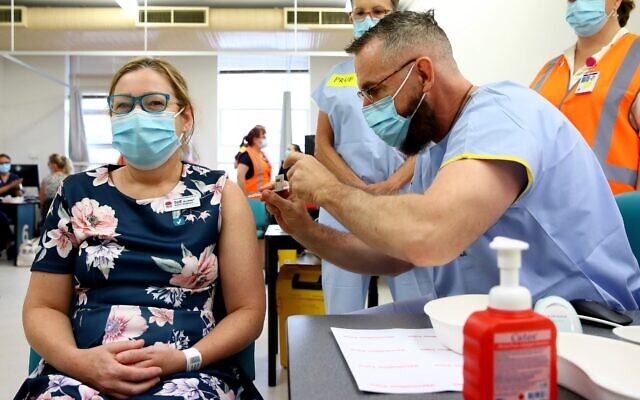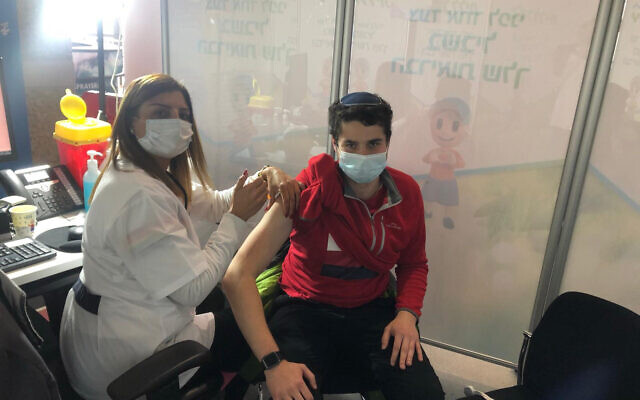‘Only pathway out of the pandemic’
Professor Sharon Lewin: 'It’s really important for everyone to get vaccinated because this is the way that we will end the disruption from COVID-19'.

WITH the first Australian receiving a COVID-19 vaccination on Sunday, marking the beginning of the national vaccination rollout, leading Jewish medical experts have encouraged community members to “get vaccinated”.
Director of the Peter Doherty Institute Professor Sharon Lewin is co-chair of the National COVID-19 Health and Research Advisory Committee, providing advice on Australia’s health response to the Commonwealth chief medical officer. “It’s really important for everyone to get vaccinated because this is the way that we will end the disruption from COVID-19,” she told The AJN this week.
Explaining that the two vaccines available in Australia – AstraZeneca and Pfizer – have been administered to over 170 million people worldwide, “they will, in effect on the individual, reduce their risk of severe disease and hospitalisation, which is really important”, she said.
“And at the same time, the vaccinations will reduce the overall amount of virus circulating in the community … and that’s how we will convert coronavirus from a serious disease to something like the common cold.”
Acknowledging that while many may feel apprehensive about potential health risks from getting vaccinated, Lewin assured, “vaccines are really not associated with long-term adverse events”, with most appearing shortly after receiving the jab.
While the short-term side effects vary between the two vaccines, Lewin said they will only last for about 24 hours and are easily treatable. “The Pfizer vaccine can give you a sore arm, aches and pains and headache … and worse after your second vaccine than your first. But those side effects will go away just with paracetamol. They’re pretty common – and can occur in up to about 50 per cent of people – because it is a new type of vaccine that really potently activates the immune system, which is a good thing.
“The AstraZeneca vaccine also has similar side effects … but [they] … are lower the second time.
“We know [that] rare adverse events that occur are one in 50,000 … To put it into perspective, a severe allergy to penicillin occurs in a frequency of one in 5000.”
Dr Jack Green, president of the Australasian Jewish Medical Federation (Victoria) cited World Health Organisation (WHO) guidelines that suggest that in a global emergency, a vaccine efficacy target of 50 per cent is enough to make a difference on disease transmission and impact.
“The benefits gained from COVID-19 vaccination far outweigh the lower risk of a severe reaction,” he said.
Sitting on the vaccine safety, evaluation, monitoring and confidence committee of the Australian Technical Advisory Group on Immunisation COVID-19 Working Group, University of NSW’s Kirby Institute Professor John Kaldor provides advice on the immunisation program for COVID-19 vaccines to the Federal Minister for Health.
“Many countries are very carefully observing short-term side effects, and seeing that these products are remarkably safe … And we can assume based on general vaccine experience, that there won’t be long-term side effects,” he concurred.
“It’s clear that in the long term, vaccination is the only real pathway out of the pandemic.”
Commenting on the efficacy and effectiveness of the vaccination, Kaldor said, “The knowledge will continue to evolve … but the bottom line is that the vaccines that are becoming available in Australia are very, very good at protecting against severe disease …
“The big unknown we are waiting for more data on is how effective they are against actually acquiring the infection – in other words, if you get exposed, whether you are likely to become infected and infectious, even if you don’t get sick.”
With different variants of COVID emerging, Kaldor said the vaccination must be adaptable for tweaks – just like the annual influenza vaccination.
“The other big unknown is how long the protection lasts … months, or beyond months,” he added.

Deeming Israel’s rollout “a spectacular success story”, Lewin noted, “Australian health authorities actually have been in touch with the Israeli health authorities to understand what they’ve done and how they’ve made sure that they get six doses from every vial of the Pfizer vaccine … We won’t roll it out as quickly because our vaccine is coming in batches, while Israel had access to a very large number of vaccines upfront – and of course, they have a much lower population to vaccinate.”
Jared Levy is an Australian who is living in Israel while partaking in a gap year program. He received his vaccination last month in Jerusalem.
He reflected, “I feel really lucky and privileged and I can now see that they [Israel] are taking every step to protect their people.”

comments